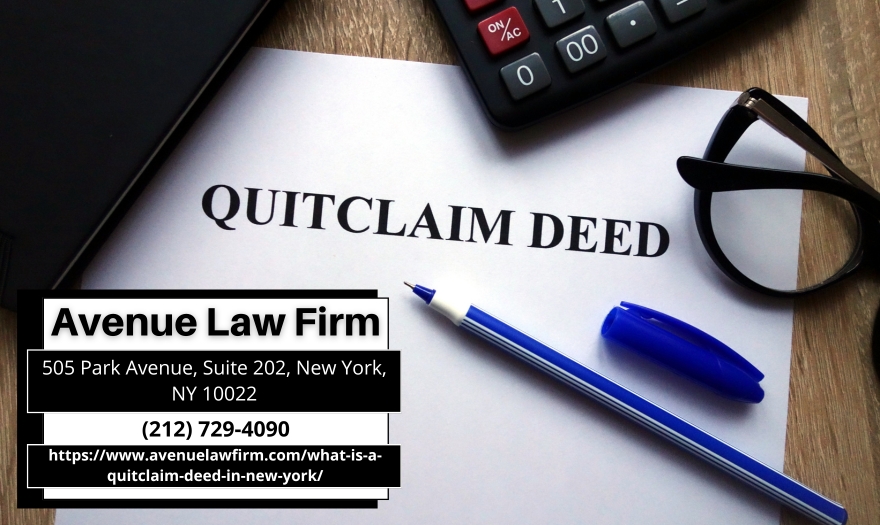New York City real estate attorney Peter Zinkovetsky (https://www.avenuelawfirm.com/what-is-a-quitclaim-deed-in-new-york/) of Avenue Law Firm has released an article helping New Yorkers better understand the role and limitations of quitclaim deeds in property transactions. In a recent article, Zinkovetsky breaks down how quitclaim deeds function, when they are typically used, and why legal guidance is crucial to avoid unintended consequences.
As a New York City real estate attorney, Peter Zinkovetsky explains that a quitclaim deed is a legal document used to transfer any ownership interest a person may have in a property to another party, without making any promises or guarantees about the property title. This means that the grantor is simply giving up whatever rights they have—if any—without confirming whether the title is clear or whether the property is free of liens or claims.
“Quitclaim deeds can be useful in the right context, but they come with limited protection for the receiving party,” said New York City real estate attorney Peter Zinkovetsky. “It’s essential that people understand exactly what is and isn’t being transferred when using this type of deed.”
A quitclaim deed is most appropriate when there is a high level of trust between the parties. Common situations include transferring property to a spouse after marriage, assigning full ownership after a divorce, moving ownership into a trust, or transferring a co-owner’s share to another partner. In these non-sale scenarios, where both parties know the history and condition of the property, the simplicity of a quitclaim deed is often appealing.
However, Peter Zinkovetsky emphasizes that a quitclaim deed should not be used for real estate transactions involving valuable consideration or between unfamiliar parties. Unlike warranty deeds, a quitclaim deed provides no title search, no title insurance, and no assurances that the property is free from liens or disputes. This exposes the grantee to potential legal or financial issues related to unclear or defective ownership.
Filing a quitclaim deed in New York requires that the deed be in writing, notarized, and submitted to the appropriate county clerk’s office. For properties located in New York City, specific forms such as TP-584-NYC and RP-5217 NYC are also required. For properties outside the city, other county-specific versions of these forms must be filed.
“Filing the deed quickly is important,” said Zinkovetsky. “If more than one deed exists for the same property, the one recorded first typically takes legal precedence.”
Although quitclaim deeds offer minimal legal protection, they also have certain advantages. They are relatively fast to execute, avoid the need for probate in some cases, and may be used to save on taxes if part of a divorce settlement or a gift transfer. Still, Peter Zinkovetsky cautions that these benefits should not outweigh the risks if the transaction involves uncertainties about ownership or potential financial liabilities.
In New York, a quitclaim deed does not release the grantor from any existing mortgage responsibilities or tax obligations unless additional legal steps are taken. If the property has outstanding debts, transferring interest via a quitclaim deed does not resolve those liabilities—they remain attached to the property, which may catch the grantee off guard.
To mitigate these risks, Zinkovetsky strongly advises individuals to consult a real estate attorney before proceeding. “It’s always best to understand the full implications of what is being signed or received. A quitclaim deed may seem simple, but the legal consequences can be serious,” he noted.
Whether the goal is to transfer property to a family member or adjust ownership following a divorce, having the right legal support helps ensure the transaction is valid, properly recorded, and aligned with long-term interests.
About Avenue Law Firm:
Avenue Law Firm is a trusted New York law firm focused on real estate transactions across the city. Led by New York City real estate attorney Peter Zinkovetsky, the firm assists clients with property transfers, title reviews, and deed preparation. The firm is committed to ensuring that all legal processes are handled efficiently and correctly, with a focus on protecting clients’ financial and legal interests in every transaction.
Embeds:
Youtube Video: https://www.youtube.com/watch?v=rnyi-Msp1d0
GMB: https://www.google.com/maps?cid=14223199020890935024
Email and website
Email: peter@avenuelawfirm.com
Website: https://avenuelawfirm.com/
Media Contact
Company Name: Avenue Law Firm
Contact Person: Peter Zinkovetsky
Email: Send Email
Phone: (212) 729-4090
Address:505 Park Ave Suite 202
City: New York
State: New York 10022
Country: United States
Website: https://avenuelawfirm.com/

